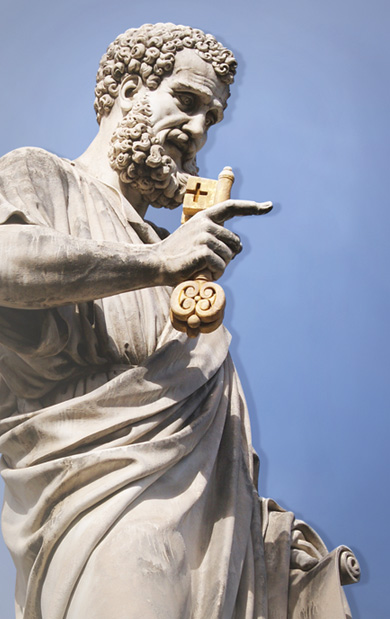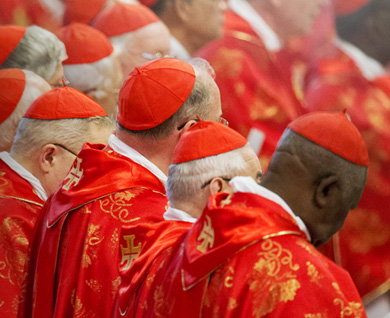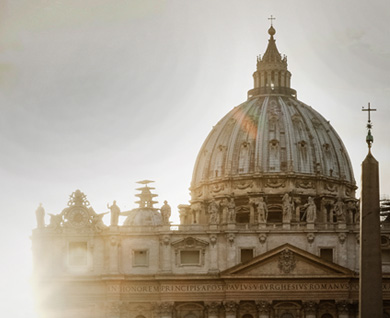Papal Timeline
-
Leo XIV
2025 - Present
-
Francis
2013 - 2025
-
Benedict XVI
2005 - 2013
-
John Paul II
1978 - 2005
-
John Paul I
1978 - 1978
-
Paul VI
1963 - 1978
-
John XXIII
1958 - 1963
-
Pius XII
1939 - 1958
-
Pius XI
1922 - 1939
-
Benedict XV
1914 - 1922
-
Pius X
1903 - 1914
-
Leo XIII, O.F.S.
1878 - 1903
-
Pius IX, O.F.S.
1846 - 1878
-
Gregory XVI, O.S.B.
1831 - 1846
-
Pius VIII
1829 - 1830
-
Leo XII
1823 - 1829
-
Pius VII, O.S.B.
1800 - 1823
-
Pius VI
1775 - 1799
-
Clement XIV, O.F.M.
1769 - 1774
-
Clement XIII
1758 - 1769
-
Benedict XIV
1740 - 1758
-
Clement XII
1730 - 1740
-
Benedict XIII, O.P.
1724 - 1730
-
Innocent XIII
1721 - 1724
-
Clement XI
1700 - 1721
-
Innocent XII
1691 - 1700
-
Alexander VIII
1689 - 1691
-
Innocent XI
1676 - 1689
-
Clement X
1670 - 1676
-
Clement IX
1667 - 1669
-
Alexander VII
1655 - 1667
-
Innocent X
1644 - 1655
-
Urban VIII
1623 - 1644
-
Gregory XV
1621 - 1623
-
Paul V
1605 - 1621
-
Clement VIII
1592 - 1605
-
Leo XI
1605 - 1605
-
Gregory XIV
1590 - 1591
-
Innocent IX
1591 - 1591
-
Sixtus V, O.F.M.
1585 - 1590
-
Urban VII
1590 - 1590
-
Gregory XIII
1572 - 1585
-
Pius V, O.P.
1566 - 1572
-
Pius IV
1559 - 1565
-
Paul IV, C.R.
1555 - 1559
-
Julius III
1550 - 1555
-
Marcellus II
1555 - 1555
-
Paul III
1534 - 1549
-
Clement VII
1523 - 1534
-
Adrian VI
1522 - 1523
-
Leo X
1513 - 1521
-
Julius II
1503 - 1513
-
Alexander VI
1492 - 1503
-
Pius III
1503 - 1503
-
Innocent VIII
1484 - 1492
-
Sixtus IV, O.F.M.
1471 - 1484
-
Paul II
1464 - 1471
-
Pius II
1458 - 1464
-
Callixtus III
1455 - 1458
-
Nicholas V
1447 - 1455
-
Eugene IV, O.S.A.
1431 - 1447
-
Martin V
1417 - 1431
-
Gregory XII
1406 - 1415
-
Innocent VII
1404 - 1406
-
Boniface IX
1389 - 1404
-
Urban VI
1378 - 1389
-
Urban V, O.S.B.
1362 - 1370
-
Innocent VI
1352 - 1362
-
Clement VI, O.S.B.
1342 - 1352
-
Benedict XII, O.Cist.
1334 - 1342
-
John XXII
1316 - 1334
-
interregnum
1314 - 1316
-
Clement V
1305 - 1314
-
Benedict XI, O.P.
1303 - 1304
-
Boniface VIII
1294 - 1303
-
Celestine V, O.S.B.
1294 - 1294
-
Nicholas IV, O.F.M.
1288 - 1292
-
Honorius IV
1285 - 1287
-
Martin IV
1281 - 1285
-
Nicholas III
1277 - 1280
-
John XXI
1276 - 1277
-
Gregory X
1271 - 1276
-
Innocent V, O.P.
1276 - 1276
-
Adrian V
1276 - 1276
-
Clement IV
1265 - 1268
-
Urban IV
1261 - 1264
-
Alexander IV
1254 - 1261
-
Innocent IV
1243 - 1254
-
Gregory IX
1227 - 1241
-
Celestine IV
1241 - 1241
-
Honorius III
1216 - 1227
-
Innocent III
1198 - 1216
-
Celestine III
1191 - 1198
-
Clement III
1187 - 1191
-
Urban III
1185 - 1187
-
Gregory VIII
1187 - 1187
-
Lucius III
1181 - 1185
-
Alexander III
1159 - 1181
-
Adrian IV, O.S.A.
1154 - 1159
-
Anastasius IV
1153 - 1154
-
Eugene III, O.Cist.
1145 - 1153
-
Lucius II
1144 - 1145
-
Celestine II
1143 - 1144
-
Innocent II
1130 - 1143
-
Honorius II
1124 - 1130
-
Callixtus II
1119 - 1124
-
Gelasius II, O.S.B.
1118 - 1119
-
Paschal II, O.S.B.
1099 - 1118
-
Urban II, O.S.B.
1088 - 1099
-
Victor III, O.S.B.
1086 - 1087
-
Gregory VII, O.S.B.
1073 - 1085
-
Alexander II
1061 - 1073
-
Nicholas II
1058 - 1061
-
Stephen IX (X), O.S.B.
1057 - 1058
-
Victor II
1055 - 1057
-
Leo IX
1049 - 1054
-
Benedict IX
1047 - 1048
-
Damasus II
1048 - 1048
-
Clement II
1046 - 1047
-
Gregory VI
1045 - 1046
-
Sylvester III
1045 - 1045
-
Benedict IX
1045 - 1045
-
Benedict IX
1032 - 1044
-
John XIX
1024 - 1032
-
Benedict VIII
1012 - 1024
-
Sergius IV
1009 - 1012
-
John XVIII
1003 - 1009
-
Sylvester II
999 - 1003
-
John XVII
1003 - 1003
-
Gregory V
996 - 999
-
John XV
985 - 996
-
John XIV
983 - 984
-
Benedict VII
974 - 983
-
Benedict VI
973 - 974
-
John XIII
965 - 972
-
Leo VIII
964 - 965
-
John XII
955 - 964
-
Benedict V
964 - 964
-
Agapetus II
946 - 955
-
Marinus II
942 - 946
-
Stephen VIII (IX)
939 - 942
-
Leo VII, O.S.B.
936 - 939
-
John XI
931 - 935
-
Stephen VII (VIII)
928 - 931
-
John X
914 - 928
-
Leo VI
928 - 928
-
Lando
913 - 914
-
Anastasius III
911 - 913
-
Sergius III
904 - 911
-
Benedict IV
900 - 903
-
Leo V
903 - 903
-
John IX, O.S.B.
898 - 900
-
Theodore II
897 - 898
-
Stephen VI (VII)
896 - 897
-
Romanus
897 - 897
-
Formosus
891 - 896
-
Boniface VI
896 - 896
-
Stephen V (VI)
885 - 891
-
Adrian III
884 - 885
-
Marinus I
882 - 884
-
John VIII
872 - 882
-
Adrian II
867 - 872
-
Nicholas I
858 - 867
-
Benedict III
855 - 858
-
Leo IV, O.S.B.
847 - 855
-
Sergius II
844 - 847
-
Gregory IV
827 - 844
-
Eugene II
824 - 827
-
Valentine
827 - 827
-
Paschal I
817 - 824
-
Stephen IV (V)
816 - 817
-
Leo III
795 - 816
-
Adrian I
772 - 795
-
Stephen III (IV)
767 - 772
-
Paul I
757 - 767
-
Stephen II (III)
752 - 757
-
Zachary
741 - 752
-
Stephen
752 - 752
-
Gregory III
731 - 741
-
Gregory II
715 - 731
-
Constantine
708 - 715
-
John VII
705 - 708
-
Sisinnius
708 - 708
-
John VI
701 - 705
-
Sergius I
687 - 701
-
Conon
686 - 687
-
John V
685 - 686
-
Benedict II
684 - 685
-
Leo II
681 - 684
-
Agatho
678 - 681
-
Donus
676 - 678
-
Adeodatus II, O.S.B.
672 - 676
-
Vitalian
657 - 672
-
Eugene I
654 - 657
-
Martin I
649 - 654
-
Theodore I
642 - 649
-
John IV
640 - 642
-
Severinus
638 - 640
-
Honorius I
625 - 638
-
Boniface V
619 - 625
-
Adeodatus I
615 - 619
-
Boniface IV, O.S.B.
608 - 615
-
Boniface III
607 - 608
-
Sabinian
604 - 607
-
Gregory I, O.S.B.
590 - 604
-
Pelagius II
579 - 590
-
Benedict I
575 - 579
-
John III
561 - 575
-
Pelagius I
556 - 561
-
Vigilius
537 - 555
-
Silverius
536 - 537
-
Agapetus I
535 - 536
-
John II
533 - 535
-
Boniface II
530 - 533
-
Felix IV (III)
526 - 530
-
John I
523 - 526
-
Hormisdas
514 - 523
-
Symmachus
498 - 514
-
Anastasius II
496 - 498
-
Gelasius I
492 - 496
-
Felix III (II)
483 - 492
-
Simplicius
468 - 483
-
Hilarius
461 - 468
-
Leo I
440 - 461
-
Sixtus III
432 - 440
-
Celestine I
422 - 432
-
Boniface I
418 - 422
-
Zosimus
417 - 418
-
Innocent I
401 - 417
-
Anastasius I
399 - 401
-
Siricius
384 - 399
-
Damasus I
366 - 384
-
Liberius
352 - 366
-
Julius I
337 - 352
-
Mark
336 - 337
-
Sylvester I
314 - 336
-
Miltiades
311 - 314
-
Eusebius
309 - 311
-
Marcellus I
308 - 309
-
Marcellinus
296 - 308
-
Caius
283 - 296
-
Eutychian
275 - 283
-
Felix I
269 - 274
-
Dionysius
259 - 268
-
Sixtus II
257 - 258
-
Stephen I
254 - 257
-
Lucius I
253 - 254
-
Cornelius
251 - 253
-
Fabian
236 - 250
-
Anterus
235 - 236
-
Pontian
230 - 235
-
Urban I
222 - 230
-
Callixtus I
217 - 222
-
Zephyrinus (Zephyrin)
199 - 217
-
Victor I
189 - 198
-
Eleutherius
174 - 189
-
Soter
166 - 174
-
Anicetus
155 - 166
-
Pius I
140 - 142
-
Hyginus
136 - 140
-
Telesphorus
125 - 136
-
Sixtus I
115 - 125
-
Alexander I
105 - 115
-
Evaristus (Aristus)
97 - 105
-
Clement I
88 - 97
-
Anacletus (Cletus)
76 - 92
-
Linus
64 - 76
-
Peter
30 - 64
An office or bureau of the Holy See, such as the Dicastery for the Doctrine of the Faith or the Dicastery for Divine Worship and the Discipline of the Sacraments.
Prior to the reform of the Roman Curia promulgated by Pope Francis in Predicate evangelium (22 March 2022), the larger and more important departments were called Congregations, e.g. Congregation for the Doctrine of the Faith.
Petrine refers to the unique office of St. Peter in the Church, and of the Bishop of Rome as his successor (Mt. 16:13-18). St. Peter was given the duty of confirming his brothers (the apostles) in the faith (Luke 22:32). Peter's successors, the Bishops of Rome, inherit this Petrine ministry to guard and confirm the unity of faith of his brothers, the bishops, and thereby all members of the Church.
The legal weight and binding authority of the decisions of the Roman Curia comes from the will of the Supreme Pontiff. Canon 60 of the 1983 Code of Canon Law states:
The Supreme Pontiff conducts the business of the universal Church by means of the Roman Curia, which fulfills its duty in his name and by his authority.
The 12 Apostles of Jesus Christ considered as a group. Also, their successors, the bishops of the Catholic Church, considered as a group. The apostles, taught by Christ, were individually able to expound revelation with authority, as St. Paul makes clear in 2 Thess. 2:15. Yet, sometimes they also acted as a college in union with Peter, as in the Council of Jerusalem (Acts 15). While the bishops do not have the individual charism the apostles had, when they teach or otherwise act with the Pope in a collegial act it carries the same weight. The most solemn cases of this are the dogmatic and judicial canons of the Ecumenical Councils.
The Internal Forum is the arena of conscience. When a person reveals their interior life to a confessor in the Sacrament of Penance, to a spiritual director, or in similar situations with an expectation of complete confidence, it is said to be in the Internal Forum. The Church provides canonical sanctions for its violation, in the most severe case the automatic excommunication of a confessor who reveals information identifiable with a particular penitent.
On the other hand, the External Forum concerns matters of external ecclesiastical governance. Decisions in this forum have public effect, for example, the making of laws, and the punishment of their violation, or a decision about the validity of a marriage.
A See is a seat of authority, from the Latin sede. Jesus said the Pharisees sat on the chair of Moses (Mt. 23:2f). Judges sit on a bench, representing the authority of the state. Professors hold chairs of academic authority. And in the Church bishops possess chairs of spiritual authority. Thus, a diocese is called a See.
The Roman diocese has been called the Apostolic See from ancient times. It is the seat of authority of the chief Apostle, Peter, and where the Apostles Peter and Paul were martyred. It is the Holy See, since its bishop has Christ’s authority over holy things. These expressions apply not only to the Pope, but also to those who assist him in governing the universal Church. [Code of Canon Law c. 361]










